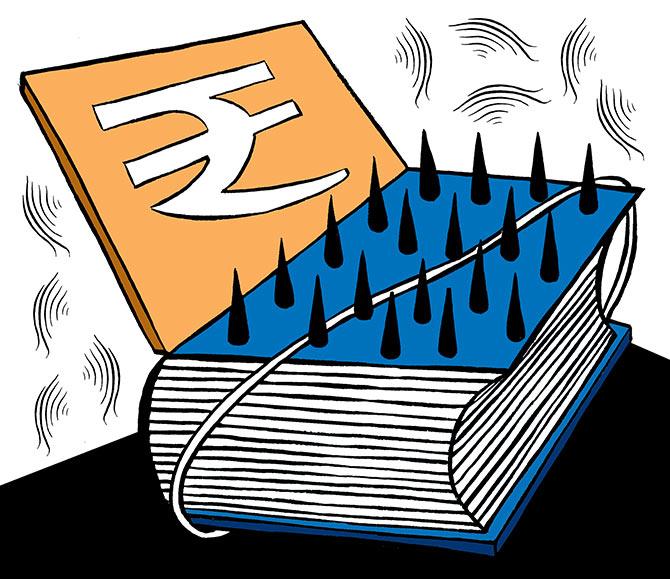'You can disagree with Dr Ilaiah's analyses of how the caste-based economy works, or with his prescriptions on how to fix it.'
'But a disagreement that is couched in terms of 'offence' given and received shuts down the debate that is essential to build a more just and modern India,' argues Mihir Sharma.
Illustration: Uttam Ghosh/Rediff.com

Last month, the Supreme Court refused to hear a public interest litigation, or PIL, that demanded a ban on a book by the Hyderabad-based political scientist and writer Kancha Ilaiah.
The Supreme Court said that a ban would infringe on Dr Ilaiah's Constitutional right to free speech and expression -- while pointing out that that right was circumscribed by law.
This is an increasingly rare victory for 'offensive' speech in India, and it should be celebrated.
Dr Ilaiah has never shied away from provocation, but given the increasing intolerance for speech that could offend somebody and anybody, it was far from clear that things would turn out as well this time as they have on many occasions in the past.
In fact, the book -- Post-Hindu India -- that had provoked petitioners into seeking a ban was itself not recent, but written in 2009.
Like much of Dr Ilaiah's work, it is a polemic about caste relations and caste consciousness; but Dr Ilaiah told the Hindustan Times that the violent reaction he has been exposed to over the past month or so is 'unlike anything he has experienced' in decades.
He has now applied for police protection, and quit his job at a university in Hyderabad.
One particular section, dealing with the traditionally mercantile castes, has recently provoked anger; it accuses businesses that are run on caste lines of 'social smuggling', which Dr Ilaiah describes as 'the economic process of exploitation... which means earning in business but not investing back into society'.
The anger emanated particularly from a caste-based group that calls itself the Arya Vysya.
Several Telugu Desam Party leaders have suggested that he be publicly hanged, or that his legs should be broken.
Dr Ilaiah has also said that he has been attacked, including with slippers and stones, on the road to Hyderabad last month.
It is the Arya Vysya that brought forward the PIL that has now been rejected.
Dr Ilaiah had said he was prepared to withdraw his book if the Arya Vysya promised that five per cent of jobs in their businesses were given to Dalits, Adivasis, and other deprived communities. This offer was, unsurprisingly, rejected.
Dr Ilaiah, in his trenchant criticism of caste organisations and how it interacts with the modern economy, is not saying anything more 'offensive' than Dr B R Ambedkar himself had said.
In declaring that caste-based structures are 'anti-production' and 'anti-science', not to mention exploitative, he can hardly be considered to be out of the mainstream of Dalit activism.
Yet the dismissal of the PIL against his book does not end the legal threats to which he has been exposed; on the instructions of a Telangana court, a case has been registered against him for 'promoting enmity between social groups' and 'maliciously outraging' religious beliefs -- as well as under the SC/ST (Prevention of Atrocities) Act.
This is the logical end-point of any restrictions on writers that are meant to prevent them from being offensive.
They will inevitably be used to silence the marginalised.
On this occasion, the Supreme Court has been able to step in, although the threats to Dr Ilaiah, legal and otherwise, are not over.
When we defend laws that minimise 'offensive' speech, even if we do so for the best of reasons -- to protect the voiceless, say, or to minimise social tension -- we ensure that they will eventually be turned against those who do, in fact, represent the powerless.
You can disagree with Dr Ilaiah's analyses of how the caste-based economy works, or with his prescriptions on how to fix it. That's OK.
But a disagreement that is couched in terms of 'offence' given and received shuts down the debate that is essential to build a more just and modern India.
It is essential that we do, in fact, expose ourselves to the discomfort of sharply differing views.
It is not easy for anyone upper caste to read, for example, Dr Ilaiah's claim -- based on an article published in the Economic & Political Weekly -- that 90 per cent of those who sit on corporate boards are Brahmin or Vaishya names.
But we need to reckon with such claims, however uncomfortable they may make us.
Over in the United States, there is a bit of an outcry because Harper Lee's classic novel about racial discrimination, To Kill a Mockingbird, has been dropped from the syllabus of a large Mississippi town -- supposedly because 'some language in the book makes people uncomfortable'.
Well, good. The point of books like To Kill a Mockingbird, and of analyses like Dr Ilaiah's, is precisely to make people uncomfortable.
If a book like that makes you uncomfortable, you are perhaps precisely the person who needs to read it, and internalise the arguments that it makes.
The Supreme Court has, on this occasion, spoken up for the discomfort that the freedom of expression can impose upon a society. The three-judge bench said that freedom of expression 'has been put on the highest pedestal by this court'.
If only that had always been true. But let us hope that, going forward, it will become more and more true.












 © 2025
© 2025